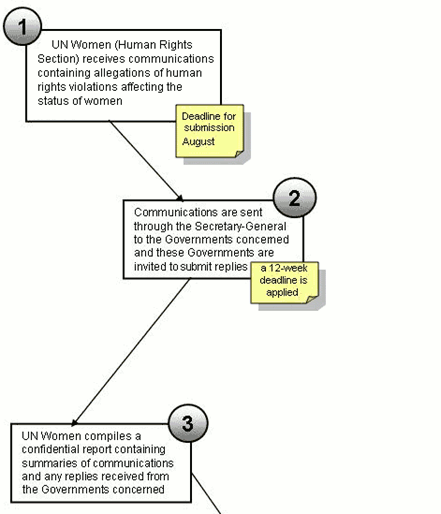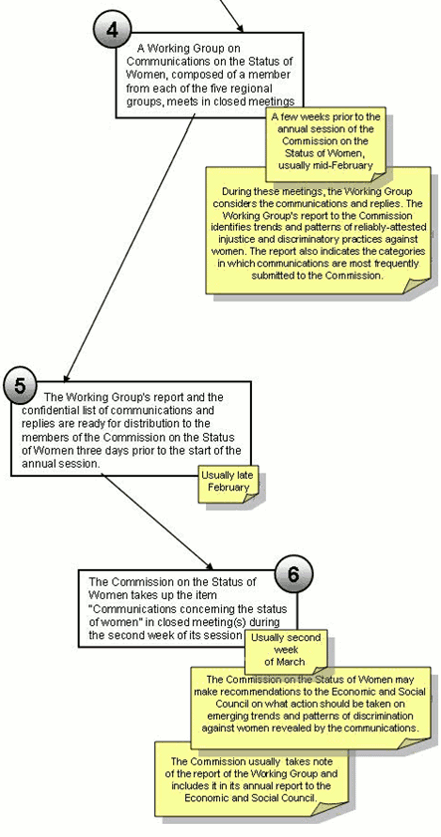Communications procedure
Any individual, non-governmental organization, group or network may submit communications (complaints/appeals/petitions) to the Commission on the Status of Women containing information relating to alleged violations of human rights that affect the status of women in any country in the world. The Commission on the Status of Women considers such communications as part of its annual programme of work in order to identify emerging trends and patterns of injustice and discriminatory practices against women for purposes of policy formulation and development of strategies for the promotion of gender equality.
Please note that the Commission on the Status of Women does not take decisions on the merit of communications that are submitted to it and, therefore, the communications procedure does not provide an avenue for the redress of individual grievances.
DEADLINE FOR SUBMISSION: Any person or organization with a communication should write by 1 August 2023. More information.
The current communications procedure of the Commission on the Status of Women has its roots in Economic and Social Council resolution 76 (V) of 5 August 1947, as amended by the Council in resolution 304 I (XI) of 14 and 17 July 1950. The mandate of the Commission on the Status of Women to consider communications has been reaffirmed and the modalities of the procedure have been further modified by the Council (see Council resolutions 1983/27 of 26 May 1983, 1992/19 of 30 July 1992, 1993/11 of 27 July 1993, 2009/16 of 28 July 2009 and decision 2002/235 of 24 July 2002).
What types of communications are sought?
Accurate and detailed information relating to the promotion of women's rights in political, economic, civil, social and educational fields in any country anywhere in the world.
What information should be included in a communication?
It is advisable that communications should:
- Identify as far as possible the woman victim, or women victims (note: the names of victims will be shared with the Government concerned for its reply);
- Indicate clearly where (the particular country) the alleged violation(s) or pattern of violations have occurred or are occurring. Separate communications should be submitted per country in which alleged violations have taken place;
- Provide, when available, dates and circumstances of the alleged violations;
- Explain the context by providing relevant background information; and
- Provide, when available, copies of documentation.
The procedure


Examples
The following are examples of categories of communications received and trends and patterns identified in recent years:
- Arbitrary arrests of women
- Deaths and torture of women in custody
- Forced disappearances or abductions of women
- Discriminatory application of punishments in law based on sex, including corporal and capital punishment
- Violation of the rights of women human rights defenders to freedom of expression and assembly
- Threats or pressure exerted on women not to complain or to withdraw complaints
- Impunity for violations of the human rights of women
- Stereotypical attitudes towards the role and responsibilities of women
- Domestic violence
- Forced marriage and marital rape
- Virginity testing
- Contemporary forms of slavery, including trafficking in women and girls
- Sexual harassment of women in the workplace
- Unfair employment practices based on sex, including unequal pay
- Lack of due diligence by States to adequately investigate, prosecute and punish perpetrators of violence against women
- Discrimination against women under immigration and nationality laws
- Violations of the rights of women to own and inherit property
- Discrimination against women in accessing international humanitarian aid
- Forcible evictions of women in conflict situations
Submission of Claims
All claims must be signed and submitted in writing by e-mail, and directed to the CSW Communications Procedure. However, the author's identity is not made known to the Government(s) concerned unless she/he agrees to the disclosure.
Where to submit a communication to the Commission on the Status of Women
Any person or organization with a communication should write by 1 August 2023 to:
[ Click to reveal ]